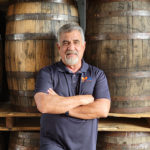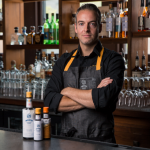Rum talks with CASHAIN DAVID – Kromanti Distillery & Blending House
Cashain David is the founder and CEO of the Kromanti Distillery & Blending House. He describes himself as a Rum Architect as he crafts personal stories into spiritual drinks and devilish cocktails.
“My career background is in Mental Wellbeing and community engagement, and my experience of encouraging personal storytelling as a way to reinforce resilience and confidence has taken shape in the iconic drink of the Caribbean, Rum. Kromanti’s first expression is a Tamarind Infused Spiced Rum that we are very proud of and believe it is the world’s first rum infused with Tamarind,” Cashain said.
Learn more about Cashain David, CEO, and Founder at Kromanti Distillery & Blending House, in the next interview:
TRL: What does the rum mean for you? What made you fall in love with rum and when did it happen?
As a child growing up in a Caribbean household, Rum was always present despite our family being very religious and teetotal. However, it was the liquid that lubricated family events such as births, weddings, and deaths; but more than that; it was also used to carry some of the ‘old remedies’ that travelled from the Caribbean with the Windrush wave of ex-pats to England. Much of this knowledge was passed on orally in stories, sayings, and proverbs, whilst others were kept as family secrets handed down through the generations.
My love of Rum was gained whilst listening to these stories of ‘home’ at the feet of uncles and Aunts during these family events as we watched the ‘big people’ play dominoes and dance into the small hours. Finally tasting rum in a small rum shop in the Dominican rainforest helped me to more deeply understand the value of the rum life and my realization that this culture and customs had a real value and significance that prompted me to start recording these stories & knowledge for future generations.
TRL: Three essential characteristics that define the rum according to your perspective.
– Connection – bringing people together,
– Conscious – having a social purpose to make the world better
– Heritage – amplifying the hidden stories of African and Caribbean peoples
TRL: What is the most important contribution you have made in the rum industry?
That chapter is still being written but providing a space for authentic stories from people within our community contributes to changing the rum story. I have found that when I do these incredible things happen. Stories are universal, but we are telling the Rum story from the very Caribbean lived experience.
TRL: Benefits that the rum industry has given you.
I think this would have to be a more interesting way to talk about the importance of heritage which is critical for valuing yourself and the people around you. Most of my career has been in mental health and I have seen first-hand the transformative power of enabling people to tell their truth and use that to connect with other people. This is an extension of my work in healthcare and allows me to have a lot of fun with it.
TRL: What´s another thing you are passionate about, in addition to rum? Why?
I love walking on the mountains and use it as a time to think and connect with my higher purpose. It’s during these moments that I connect my physical and spiritual worlds and see how small I am with the world. It’s a reminder about the challenges that I have in my everyday life and how to put them into perspective.
TRL: What is your favorite place for drinking rum?
It’s actually at home during a family get-together. This usually involves food, dominoes, storytelling, and laughing. With the right people, you can create this atmosphere in a bar too, and I wish more of them would cultivate this vibe.
TRL: Favorite drink + Recipe
My ‘go-to drink has to be a Ti’ Punch. The simplicity of this drink (Rum, Lime & Sugar) belies its social significance. It was during a short stay in Martinique that I saw the small island hospitality and welcome that this simple drink represents and have been a fan ever since.
TRL: Why is it important to educate the rum consumer?
There is a great opportunity to share stories and heritage through drinking rum. It’s such a flexible and iconic liquid that we often forget to do more of that in this industry and focus on the production aspects of the drink such as aging and distillation techniques rather than the social significance of Rum. We all have stories to tell; why not use rum to tell your own.
TRL: Any tips to train the palate and taste a good premium rum?
On one of my first trips to Dominica, I was told by an older uncle to always drink water to chase Rum. This clears the palate and also gives you time to savor the drink as you enjoy the company you are with. The ‘nose’ (smell) of a rum is one of my favorite parts of the drinking experience and gives me a hint of what the distiller is trying to communicate through the liquid.
TRL: How can rum contribute to improving the crisis in some countries?
The crisis that most interests me is the mental health crisis driven by isolation as our lives are lived at an increasing pace to keep up with the volume of information we are being exposed to. It’s at these times that we can take a reflective pause to slow down, connect with others and enjoy a rum. The process of sharing a story or two helps to focus on the moment (and people with you) and this is helpful.
TRL: Is the commitment to sustainable development the key to success for the permanence of the rum industry in the world? Why?
Yes, I think it is and something very important to us as a family business. We are working to reduce our carbon footprint throughout our production chain, as the impact of global warming and the rising sea levels is already having an impact on the small island states in the Caribbean. On my last trip to Carriacou, the island my family is from, I saw the impact on how the sea turtles are changing their breeding locations as the beach a short walk from our house is being eroded after changes in sea levels and tropical storms patterns.
TRL: Who would like to meet in the rum industry? What would you say to him/her?
There isn’t a particular individual as I’m keen to keep learning and sharing. However, some of my targets for Rum conversations are not formally in this industry but are storytellers and anthropologists who are forever curious about how people come together and attach meaning to every aspect of everyday life.
TRL: What are your next goals in the rum industry?
I’m on a mission to reach more people in the home (UK) market and create more opportunities to expand the Rum conversation past Pirates, friendly natives, and localities. We also are keen to explore the US market with it many hidden stories that ex-pats carry with them and are similar to the UK.
Plans you have when you leave the rum industry.
I’m not leaving, get used to me.
TRL: Why is the role of the bartender important in the rum industry?
They are often the first touch on a drink experience, and I think, are ideally placed to tell the story of the drink and give it some context. Drinking consciously can be a way to express your values and aspirations so understanding the context of any cocktail is therefore really crucial to allowing customers to engage at a deeper level.
TRL: What is your advice for new generations in the rum industry?
Be yourself and find your authentic voice. If you tell a story that is true to you; you don’t need a good memory (Judge Judy)
TRL: How can people learn more about you? Website? Social media page?
Head over to our website on https://www.kromantirum.com/ If you sign up, you will get early notice of any special events or tastings that we are planning. You can also follow us on our socials listed on our page.





